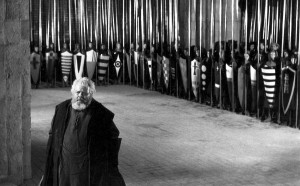I finally saw one of those films I’ve been wanting to see ever since I fell in love with cinema: Orson Welles Chimes at Midnight.
And the thing that struck me, what with the Shakespeare plays it’s based on — Henry IV Parts One and Two and Merry Wives of Windsor — is how emtional and dynamic the personal themes are. This is a story of fathers and sons, ambition and revolt, youthful rebellion and the sins of the fathers visited on the sons… experienced through young Prince Harry fighting his dad by taking the company of low-lives and hustlers personified by Welle’s magisterial, for the ages Falstaff. It’s about Harry’s ambition, his hunger to outshine the rest personified by his cruel — but necessary? — rejection of Falstaff at the end. In short, it’s the stuff of classic American drama: fathers and sons, hunger, greed and ambition. Get rich or die trying and what that means and what that takes out of a man. It’s Arthur Miller, it’s Elia Kazan, it’s Monty Clift, James Dean, Brando… It’s Shakesepare yet again centuries ahead of anyone and it’s bloody brilliant. And this, all this, is what Orson Welles captures in Chimes at Midnight.

